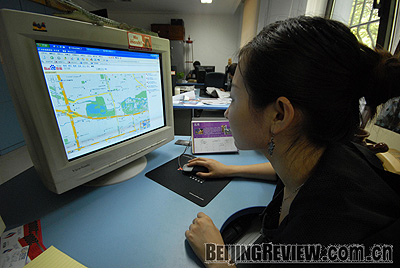|

A reshuffle of China's online map market is imminent. The Chinese Government has launched an investigation into Internet companies providing relevant services, including Google and Sohu, in an effort to protect state secrets and territorial integrity.
The government hopes to get rid of online maps that wrongly depict China's borders or that reveal military secrets, according to Min Yiren, Deputy Director of the State Bureau of Surveying and Mapping (SBSM). The investigation into the problematic maps was started in April and will be carried out through the year.
"I've thrown away paper maps since I found convenient online digital maps," student Xu Yang from Beijing Foreign Studies University told Beijing Review. Xu likes to visit museums in Beijing in his spare time and online map services provided by China's largest search engine Baidu.com have offered proved a convenient way of finding them.
"I just put down my current location and my destination, then the map search engine will show me several options to get to my destination, by bus or by subway and where to take transfers," he said. "The online map provides more convenient, fast and accurate information than traditional maps."
Min revealed that there were some 10,000 online map websites operated in China, most of them showing maps without approval.
According to online market research firm iResearch's 2007 China Online Map Research Report, the total market value of China's online map service has reached 550 million yuan ($80 million), with an increase of 150 percent over 2006. In the forthcoming years, the market will maintain its rapid growth and is expected to top 670 million yuan ($96 million) in 2010.
With technological advancements, new services have emerged, including streetscape and three-dimensional maps. Users have become more active and profit models have become diversified, according to iResearch's report.
"It's for certain that online map services will become more and more popular," said Sun Yuguo, Vice President of the China Association for Geographic Information Systems. He explained that the service has been applied to various areas such as laptops, mobile phones, personal digital assistants and vehicle-borne GPS devices.
"Some websites publish sensitive or confidential geographical information, which might leak state secrets and threaten national security," Min warned.
The eight departments involved in the ongoing market regulation campaign, including the SBSM, the Ministry of Foreign Affairs and the Ministry of Public Security, pledged that they would tighten supervision over online map and geographical information service websites.
The campaign will also target websites that make mistakes such as labeling Taiwan a "country," wrongly drawing national boundaries, or omitting important islands, including the Nansha Qundao, Diaoyudao and Chiweidao, said Min, adding that these websites would be punished and required to make corrections or they would be closed down.
"Wrong maps could give rise to diplomatic feuds," Min said, continuing that incorrect online maps could cause harm to state interests and buyers of the maps. He called for a sense of national territory and geographic security among providers and users of online map services.
A hotline has been set up for the public to report illegal websites and the SBSM has put 418 Chinese and world maps on its website for the public to check and download.
Last year, China issued a regulation restricting surveying and mapping by foreigners to protect state security. It stipulates that foreign organizations and individuals who intend to engage in surveying and mapping must obtain approval from the Central Government and accept supervision from local governments.
Foreign organizations and individuals engaging in making and publishing online maps in China would also be stopped, Min said. | 